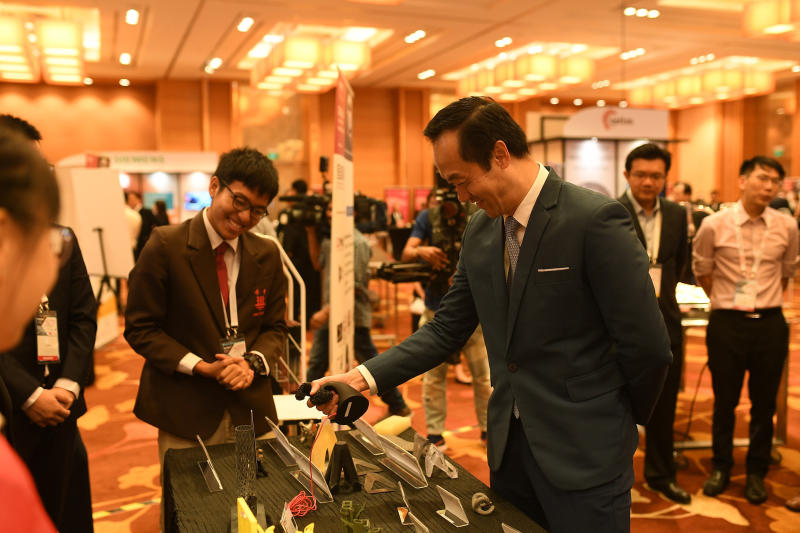Summit on 3D-printing technology gives insights into its future
Sign up now: Get ST's newsletters delivered to your inbox

Senior Minister of State for Trade and Industry Koh Poh Koon at the 3D-printing, or additive manufacturing, summit, hosted by the National Additive Manufacturing Innovation Cluster.
PHOTO: NAMIC
SINGAPORE - From the printing of synthetic skin tissue for ethical drug testing to making spare parts for port equipment, the Republic has pushed for the growth of 3D printing in industries here.
On Monday (May 6), the National Additive Manufacturing Innovation Cluster (Namic) hosted its seventh 3D-printing, or additive manufacturing, summit.
The one-week event at Marina Bay Sands Expo and Convention Centre brings together over 300 local and international delegates who will explore 3D-printing tech start-ups involved in industries such as space and pharmaceuticals.
The cluster was formed in 2015 by Spring Singapore and the National Research Foundation to help companies here develop capabilities in 3D printing.
In Singapore, its interest and adoption has been growing in various industrial sectors recently, most notably in the maritime, marine offshore, aerospace, precision engineering and biomedical sectors.
The Republic last year also set up the world's first commercial 3D-printing production facility at PSA Corp's Pasir Panjang Terminal. It will feature state-of-the-art printers to make spare parts for port equipment.
Senior Minister of State for Trade and Industry Koh Poh Koon said that "in Asia-Pacific alone, it (additive manufacturing) is expected to grow to more than US$5.5 billion (S$7.5 billion) by 2025".
"Singapore is in a good position to adopt new technologies in 3D printing, to change, disrupt and innovate manufacturing processes for improved performance and cost advantages," he added in his speech at the conference on Tuesday.
Dr Koh said Namic has been engaging the Land Transport Authority to seed the adoption of 3D printing in manufacturing spare parts for trains and buses "to enhance maintenance and engineering operations".
On Tuesday, the cluster signed a memorandum of understanding (MOU) with Germany-based 3D-printing network Mobility Goes Additive (MgA), which has an international network of companies, institutions and research institutes working on industrial-level additive manufacturing solutions.
Dr Koh said the MOU with MgA will allow local companies "to leverage plug-and-play solutions from MgA's network members", which include notable German multinational corporations such as Siemens and TÜV SÜD.
Namic's managing director Dr Ho Chaw Sing said 3D-printing technology offers mass customisation, on-demand manufacturing and specific application benefits such as light-weighting.
Combined with digital technologies, it also has "the potential to transform our future for the better, enabling more efficient supply chains, lowering carbon footprints, and integrating recycled materials into the manufacturing supply chain".
He announced that Namic will publish a business directory of all the additive manufacturing companies in Singapore and the Asean region in October this year.
It will serve as a guide to overseas companies seeking additive manufacturing products and services, or partnerships.


